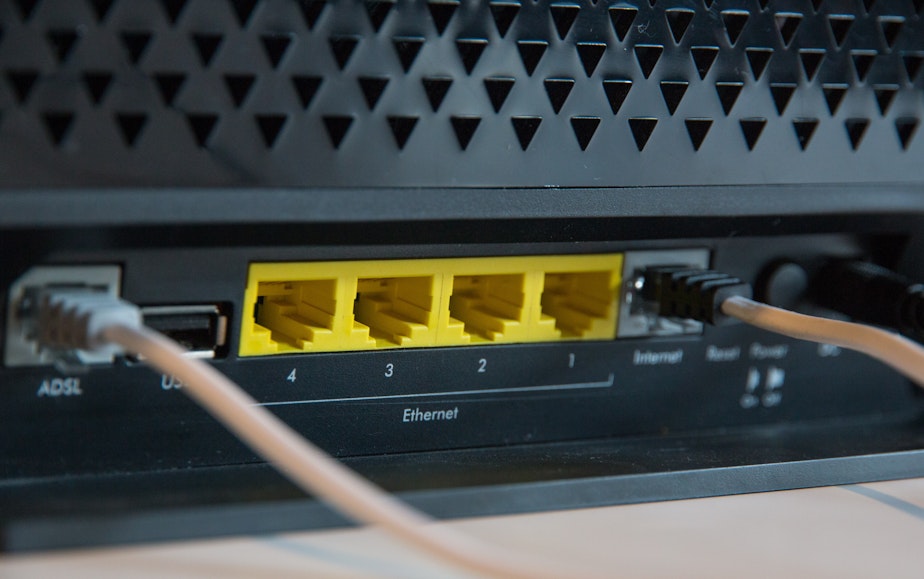Why is it so difficult to get reliable internet in rural areas?

The pandemic put the need for fast, reliable internet service into sharp relief.
People started working from home, kids were going to school online, Zoom became a household name. Internet access became a necessity, rather than a luxury.
In the main metro areas, connecting to the internet is relatively easy. You can often find multiple companies offering different options with varying speeds.
But in rural areas, modern broadband options are much more limited, if they even exist at all.
And in some cases, efforts to build broadband infrastructure in these areas have been stymied by the private sector.
Crosscut investigative reporter Brandon Block sat down with Soundside to discuss his reporting about the state’s processes for funding and building broadband infrastructure.
Block says that the biggest challenge is the expense of building the infrastructure. Because most internet providers are for profit companies, there's not a lot of money to be made in rural areas, because there are not a lot of customers there.
But that’s not the only reason why infrastructure may be lacking.
Through the state's objection process, Comcast and a company called Rural Wireless LLC, were able to halt progress on eight different broadband infrastructure improvement projects.
In Grays Harbor County, the local Public Utility District applied for a state grant to connect about 1,000 homes in these rural areas between the towns of Oakville and Elma, which are very small towns. In the objection documents filed with the state, Comcast said they only serve about a quarter of these houses, but the application was thrown out anyway.
Sponsored
As Block explains, “Unfortunately, the State didn't really look too closely at the objection, they just determined that it was a credible objection,” which halted progress for the county.
“I think a lot of it is just playing catch-up to a problem that has been going on for a long time,” Block explained. “Rural internet access is something that people might not even think about, if they're living in a big city like Seattle, where they just take internet access for granted.”
Block thinks people have become more attuned to how much the internet is really a necessity to participate in modern society.
“With the pandemic, and the advent of remote work, remote school, and things going online, it really threw into sharp contrast how, if you live in one of these areas where you don't have access, or your access is extremely slow, it really makes it difficult to participate in the modern economy,” Block said.
Unfortunately, internet access isn’t treated in the same way as other kinds of essential utilities, like water, sewer, or electricity. As for the question as to whether broadband access will gain that "utility status," Block says we’ve got a long way to go.
Sponsored
“I don't think we're gonna see the FCC suddenly step in and like break up the Comcast or Verizon or any of these companies,” Block said. “But there's certainly more resources than ever to expand public-access internet systems. And at the local level, we're seeing a lot of interesting experimentation.”
Experimentation in places like Jefferson County on the Olympic Peninsula, where they are beginning the process of putting infrastructure in place to be able to provide broadband service on a retail basis to customers.
“This is the first public utility district to get into retail internet. And that's a risky move,” Block said. “I think a lot of other public utility districts will be watching to see how the finances work out. This will kind of be a test case to see if this model is replicable across other rural areas.”
It's also important to acknowledge that it's not just rural areas that deal with lackluster broadband access. Mike Fehlauer-Hayes discovered that problem when he and his family moved out of Seattle to a cozy little spot just outside of Woodinville.
“Fifteen minutes or less from Microsoft world HQ in a normal looking neighborhood, right?” Fehlauer-Hayes told Soundside. “We didn't really give it a second thought. But once we moved in, we found out only DSL was available over traditional phone lines. And that just doesn't really cut it.”
Sponsored
Fehlauer-Hayes says they tried to make things work using a combination of satellite services and multiple hotspots, but with a family of four and everyone needing a slice of that bandwidth, it wasn't working. After exhausting all other options, he and his neighbors asked Comcast what it would cost to lay down a hardwire connection.
“It was pretty urgent of a need, so we all banded together,” Fehlauer-Hayes explained. “When Comcast came back and said, ‘Great, it’ll be $70,000,’ we all chipped in and made it happen.”
In the end, it took nearly three years to get the lines laid and service to their neighborhood. So if anyone deserves to kick back and binge on some pretty expensive Netflix, it's Fehlauer-Hayes and his neighbors.
Soundside did reach out to Comcast and Rural Wireless for comment. Comcast did not respond by time of air and Rural Wireless LLC appears to have shuttered its operations earlier this year.
You can listen to the entire conversation by clicking on the audio above.





